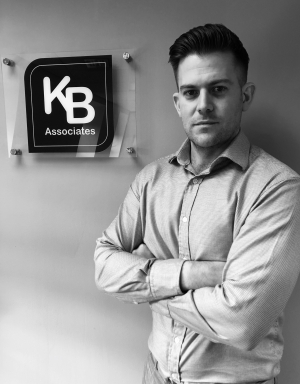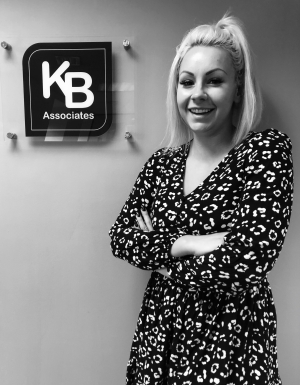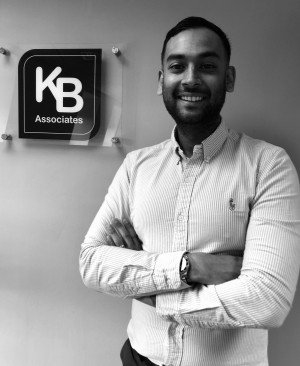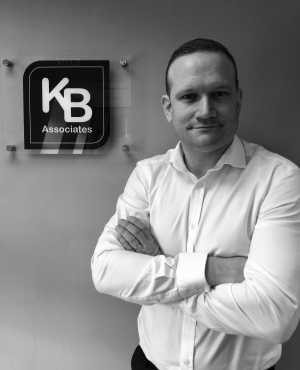Chris Potter
Jessica Larner
Jess has over fifteen years recruitment experience, working on both temporary and permanent roles across a range of industry sectors in Surrey. She has always enjoyed building and maintaining strong relationships with her clients and candidates and loves the challenge of matching the right candidate to every role.
Jess was educated in Banstead where she had a flair for languages and drama, regularly performing in her School's theatre shows. Jess also enjoys word related quizzes and appeared on an episode of Countdown in the early 00's!
When Jess isn't finding the perfect temps for her clients, she enjoys spending time with her son and partner, exotic holidays and weekends away discovering exciting new places.
Jess loves a glass of wine or a beer and is always open to trying new cuisine with friends and family.
Dean Trevellick
Dean has worked in the Finance recruitment sector for the past 5 years, spending 4 years at Reed Accountancy in Sutton before joining Kenneth Brian Associates to manage our permanent and temporary transactional finance business. Dean is a perfectionist who offers an amazing service to his candidates and won’t rest until he has produced the best shortlist for his clients. He genuinely enjoys meeting candidates and helping them find their perfect role.
Dean was born and raised on Hayling Island where he became fascinated with wind and water sports culminating in a bronze medal for him in the 2002 junior Olympics. Dean left the Island to become a Prison Officer in Surrey, a role he performed for 8 years, before moving into personal banking.
When Dean isn’t managing the Kenneth Brian team, he enjoys spending time with his friends at the local pub, but this has been severely restricted over the past 9 months by the birth of his son! He loves most sports and watches a lot of football whenever he gets the chance. Dean is a big Reading fan which doesn’t go down too well with his friends, having grown up near Portsmouth!
Dean should definitely be anyone’s phone-a-friend when it comes to his insane knowledge of the early Premier League era and is the proud owner of a very rare collection of Victorian stamps.
Amberley Whitmore
Amberley has 7 years recruitment experience working across the Office Support and Finance sectors. She spent over 4 years working for Huntress in Epsom before moving on to develop and manage an Office Support division for an Independent recruitment business in Croydon. She joined Kenneth Brian Associates in January 2020 to lead our newly created Office Support Division. Amberley enjoys the unpredictability of recruitment and the challenge of filling the unfillable role!
Amberley went to Carshalton Girls school where she completed her GCSEs and A-Levels in Business Studies, IT and Advanced Mathematics, but she started school life in Germany at an American School on an army airbase.
When Amberley isn’t filling the unfillable role, she loves to eat out at Italian, Japanese or French restaurants. She is also a member of the Wine Society and has an incredible knowledge of both reds and whites! To balance her love of food and wine, Amberley spends time at her local David Lloyd gym burning off those excess calories! She has a French bulldog called Reggie, who keeps her very busy as he’s usually up to no good.
Claire Martin
Claire has been recruiting finance and Office Support staff since she was 19 (that’s 20 something years ago!) working for high street and independent recruitment businesses including 12 years with Howett Thorpe. Claire has always enjoyed the challenge, target based and fast paced environment that comes with working in recruitment and always maintains the satisfaction of finding someone their dream job is enough to keep her going! She always gives candidates an amazing service which is why her desk is forever covered with boxes of biscuits, chocolates and bottles of wine!
In her free time, Claire is open to trying new things, but her favourite activity is spending quality and fun time with her family and friends. Claire is very active, enjoying her gym classes a few times a week, but most importantly, the spa afterwards with a large glass of wine! She loves a long, off-track walk in the Surrey Hills which are conveniently located close to where she lives. Claire definitely has the travel bug, and loves a long weekend away, finding new places to explore and enjoying different cultures and cuisines.
Not many people know this about Claire, but she briefly dated a member of the Beatles! However, this is a story for her to tell!
Anil Balgobin
Anil has worked in the Finance recruitment industry since 2007. He started his career at Alexander Lloyd in Crawley, working as a Manager and Director for Howett Thorpe and other independently owned finance recruitment businesses, before co-founding Kenneth Brian Associates in 2016. Anil’s success can be attributed to his unbelievable work ethic, always willing go the extra mile for a client or a candidate. It’s therefore no surprise that he has built lasting relationships with a huge portfolio of clients who trust him to deliver on their hiring projects, time and time again.
Anil was born and bred in Epsom, the home of Kenneth Brian Associates, where he studied A-levels before leaving full time education to work in the travel sector. His most memorable travel days include his trips to Borneo where he volunteered at the Orangutan sanctuary and worked in a specialist team releasing wild turtles back to their native habitat.
Anyone who knows Anil, knows he lives and breathes recruitment, but he does however find time to hit the gym and is very fond of tasting craft beers. Anil juggles running a business with raising a young family. He has a shiatsu named Alfie, who is also our office mascot! Anil is car mad and has owned at least 15 different cars since he started the business in 2016.
Chris Latham
Chris started his Finance recruitment career in 2000 at Reed Accountancy in Sutton, working in both the temporary and permanent divisions before becoming one of the Reed’s youngest Business Managers. He quickly established himself as a leading finance recruiter in Surrey before moving in to hands-on Managerial and Director roles for Morgan McKinley, Robert Half and Howett Thorpe. Chris has always enjoyed building successful recruitment teams and although he is still a very active recruiter, Chris is responsible for the growth and development of the Kenneth Brian business.
Chris was schooled in Horsham, West Sussex and studied English literature at Bangor University in North Wales. Chris is a huge sports fan who played age group cricket for Sussex, semi-pro football in Wales and can comfortably hack a ball around a golf course. He is a passionate Ipswich Town fan, but is finding the ‘Tractor Boys’ current demise a painful watch.
When Chris gets away from the business, he enjoys pub lunches and country walks with his Springer and Lab, watching his son play cricket, and sampling various Belgian beers. He also enjoys researching and booking travel getaways for him and his family.
Phone Interview Tips
Phone Interview Tips
Employers often want to narrow down the field before they have any face to face interviews. This gives them the chance to save money while also whittling down the huge pile of CVs they have. Phone interviews are not designed to last as long as normal interviews, and they are also not as in-depth. That being said, you do have to remember to prepare so that you are able to give a good first impression.
Before you Start
You have to do your research and you also need to make sure that you understand the company you are applying for. It also helps to study the job description and to also make a list of the requirements you need to meet. Arrange the best time for the interviewer to call and be flexible on the time as well.
Expecting the Call
When you are expecting the call, it’s important that you remove any distractions. Have your CV and notes ready, highlight any areas you’d like to stress during the appointment and also have something that you can take notes on. If you want to guarantee an uninterrupted signal, give your landline number and also have a glass of water beforehand. After all, you don’t want to sound husky!
The Way you Come Across
The way that you come across really is key during a phone interview. After all, they are not able to see your facial expressions or your body language. The only thing that they have to go off is your voice, so speak with confidence and also be careful with your choice of words. It’s important that you are able to demonstrate confidence and that you are also not too pushy. Interviews are often about balance, so make sure that you’re aware of the vocabulary you use.
Sell Yourself
You are trying to get the other person to believe that you are right for the job. You want them to put down the phone and think that you are certainly a contender. If you want to do this then you need to engage them to the point where you are able to pique their curiosity. The more you can make them want to meet you in person, the better. Going through your CV in a parrot fashion won’t be doing yourself any favours.
Listen with Intent
You’ll be absolutely fine if you have prepared well and if you are able to pinpoint what the interviewer is trying to ask you. If you rush and if you blurt out your answer, then you may end up saying the wrong thing. Take 2-3 seconds to deliver your response, but no longer. If you miss a question, ask your interviewer to repeat it as opposed to guessing.
Articulate your Answers
At the end of the day, it’s very easy to sound nervous on the phone. Take notes and focus on the flow of the conversation.
Show them What you Can Do
Talk about what you can offer and even how excited you are about the upcoming position. Do you have the right qualifications? Do you have transferrable skills? If so, then make sure that this comes across.
Your CV
Is your CV up to scratch? They’ll probably have it right in front of them and they may even quiz you about it as well. You have to make sure that yours stands out and that you also make it memorable. If your CV is out of date or if you haven’t gone through it for quite some time, then now is the time for you to change that.
Video Interviews
We live in a very high-tech world. Your potential employer may ask if your interview can be done over Skype or even WhatsApp. If so then you need to handle this in the same way that you would a normal interview. Dress the part, and put a little extra effort in. If you are having an interview, then make sure that there isn’t too much clutter in the background and maintain eye contact too. If you look around blankly or if you are distracted then they’ll be able to see this, so prepare a space ready so that when the time comes you can be prepared.
Recruiters tend to receive around 250 applications for every single job opening they have. When you look at statistics like this, you’ll soon realise that you have to make sure that your CV is up to scratch because if you don’t then you may end up losing out.
Your CV is Missing a Skills Section
Your skills section really is what you should be looking at. This is the easiest and best way for you to insert keywords and it also shows that you have the right skills for the role. If you do not have a specific section on your CV for skills or if you are actually listing your irrelevant skills, then you may find that you are underselling yourself. Sure, it’s not always super comfortable for you to talk about your achievements and your skills but the whole point of having a CV is so that you can sell yourself.
You’re Not Listing your Achievements Properly
Recruiters are always looking for candidates who are able to demonstrate a good amount of experience as well as those who are able to offer a contribution to the company in question. When you list all of your previous work experience you need to make sure that you don’t list it as if it’s your job description. Sure, listing your responsibilities is fine, but what impact did you have? If you are able to list specific accomplishments or figures, then you will probably move ahead of your competition.
You Didn’t Include a Cover Letter
When your CV is only 1-2 pages in length, you have to make sure that you are using absolutely every tool you can. A cover letter gives you the chance to speak with the hiring manager directly and you can also list why you are the ideal candidate for the job too.
You Didn’t Proofread
Errors and even spelling mistakes are a pet hate for over 71% of recruiters. You are selling yourself short if you do not take the time to check over your CV before you send it off. Spell check is your best friend here, and before you send it, make sure that you read through it at least three times.
Conclusion
Writing a fantastic CV that actually sells you and the accomplishments you have made can be stressful to say the least. If you highlight your skills and list your achievements, then this is the best way for you to come out on top.
CV Key Skills
Everyone knows that you really don’t get a second chance to make a good first impression. A lot of job seekers don’t realise that a CV is the very first impression that you make, and if yours isn’t up to scratch then you may be doing yourself more harm than good and in some instances, it may even ruin your chances of being hired altogether.
Your CV is a Record
It’s so important that your CV is the best that it can be because it’s essentially a record. It helps you to keep track of any minor achievements and it also gives you a chance to show off your accolades too.
Demonstrating Professionalism
Skills really aren’t everything when it comes to the job market. It isn’t all about what you can do, in fact, sometimes it’s actually about how you do it. Companies are always on the lookout for people who can present themselves in a professional way.
Reference
A CV helps employers to keep track of candidates and it also serves as a point of reference too. This helps to keep you visible and it also helps everyone during the hiring process.
What do Recruiters Look for?
Successful CVs stand out for a huge number of reasons. Recruiters in general however tend to pay special attention to the following traits when they are given a resume.
Presentation
The way that your CV looks is very important. Your resume should follow a standard template so that it isn’t confusing, and you also have to make sure that it is easy to read at a glance too. If it isn’t then this could make it very difficult for a potential employer to get the information they need. Inconsistent formatting, strange file formats and even typos are also to be avoided, as this is the best way for you to present yourself in a bad light.
Relevance
Employers tend to be interested in the various aspects of your history. They probably don’t care if you worked as a car washer part-time, or what you did after college. They only need to know anything that pertains to the job that is available. If you fill out your CV with every little bit of career history you have, then this could distract from the experience your potential employer is looking for.
Experience
Employers want to know what experience you have in the profession and they also want to know what skills you have too. This will help you to stand out as being the best choice for the job.
Key Skills that You need to Highlight
When you put together a CV, you'll soon find that it's difficult to know what skills you need to include and what you need to leave off. To make it easier, here are some of the skills you should be highlighting:
Administrative skills
If you arranged meetings with management, distributed paperwork or even contacted customers and/or suppliers to try and arrange deliveries then list this on your CV. You also need to include whether you handled any transmission of data between systems, and if you are experienced working with cloud-based servers.
Communication Skills
Communication skills that you should list, include whether you mediated any conflict and whether you distributed/drafted memos within your department. It’s also good to include if you read market reports, evaluated candidates for new positions or even recorded minutes at executive-level meetings.
Managerial Skills
If you worked in a managerial position, then include whether you oversaw customer service or financial operations. You also need to include whether you trained assistants, and if you ordered raw materials/confirmed amounts/managed the receipt of orders. Experience managing shop floor staff and staff rotas should also be included, along with coordinating deadlines and completion estimates between both staff and customers.
Interpersonal Skills
Interpersonal skills include managing and training new staff or taking charge of account management. You might also want to include whether you coordinated business lunches or worked with key clients. Planning annual holiday parties and even hosting employee lunches are skills that should be listed too.
IT Skills
IT skills can range from coordinating social media campaigns to building company websites with various elements such as CSS and HTML. If you oversaw the backup of files, installed software or managed scalable SaaS systems then these points should also be listed on your CV, especially if you worked with analytics or Excel databases.
Problem-Solving
Problem-solving skills should range from identifying issues with IT systems and providing alternative solutions. If you have experience in drafting reports, streamlining office functions or even addressing customer complaints then these are also great points to include.
Creativity Skills
Creativity skills include setting up a company blog, drawing up designs for products, designing new labels or logos for the company and creating invitations.
The STAR Method
When you are creating your CV, it is very important that you keep the STAR method in mind. This will help you to convey your talents and your skills in a way that employers can understand, and most importantly, remember.
Situation- You need to define a situation where you faced some sort of challenge in the workplace.
Task- Explain the task that you undertook to try and address the situation at hand.
Action- Talk about how the task was effective and even about how you implemented it into the situation.
Result- Talk about what happened and what you learnt from the challenge. Mention how this could be applied in future challenges.
All in all, you have to make sure that you present yourself professionally. A well-constructed CV will give you a huge advantage over your competition during the hiring process, but ultimately, it comes down to you as a professional too.
Most employers see the interview process as being one of the most important parts of the hiring process. There are a few ways that you can conduct an interview. For example, you can conduct it face to face, over the phone, through Skype or even via a panel. If you are preparing to interview an applicant, then you need to consider the style of the interview and you also need to think about the structure too. A structured interview is where you’ll ask predetermined questions. An unstructured interview on the other hand, is much more casual and often follows the flow of conversation.
Picking your Interviewers
When you are trying to decide who is going to interview someone, you need to think about the relationship that they are going to have with the potential employee. As a general rule, this should be an employee or manager who is overseeing the position, or even someone who is going to be working closely with the new hire. It’s also important to make sure that the interviewer has enough experience in the field to understand the position itself, and the skills that are required to do the job efficiently.
Determine the Length of the Interview
The time and length of the interview will depend on the company and the position that is being filled. If you want some guidance as to how long your interview should be, then take a look below.
Non-Manager
A one-on-one interview really should last around 45 minutes. It can however go up to an hour. If there are two interviewers, you could probably reduce the time it takes to conduct each interview by half an hour.
Manager
Management is often a leadership position. These interviews will usually take much longer, and it can sometimes last up to an hour and a half. If there are more than two interviewers, then each one should last around half an hour.
Logistics
Now that you have a good idea of who is going to be conducting the interview and how long the process is going to take, you then need to consider the logistics of it all. Some of the questions that you need to ask yourself include where the interview is going to be taking place, if you need to book a conference room and even if you will need to provide tea and coffee.
Job Documentation
If you want to get the best result out of your job interview then you need to make sure that you have all of the right documents, well in advance. This can include a copy of the job description, the applicant’s CV, the cover letter and even references too.
Interview Preparation
If you want to feel confident during the interview, then it helps to consider some of the questions that you are going to ask. Think about asking the potential candidate why they’re interested in the position, how they fit within the culture and why they think they’d be a good fit.
De-Stress
There’s a high chance that the candidate you are going to interview is super stressed out about the interview, so it helps to put them at ease. Give them as much detail as you possibly can about the interview, tell them your company’s dress code and even set out some scenario questions.
Closure
When your interview is over, you will need to provide your candidate with some degree of closure. You should do this whether you are giving them the job or not. One way for you to provide closure would be for you to extend a job offer, or to even let them know if you require them to come in for another interview.
By following the above tips, you can be sure to give your potential employees a good experience when coming in for their interview. You can also help to put them at ease too, which will help you to get a better idea of their skills and personality.










